Q&As with Martin Freeman!
Q: It seems that cinema's ideally suited to deal with dreams, being able to go from the real to the surreal easily - is that what drew you to making The Good Night?
MARTIN FREEMAN: I just came at it from the angle that I thought it was an intriguing, original screenplay. But I would agree, I think storytelling is a way of getting across not necessarily very literal things that you dream about. It's almost impossible to describe a dream but the sort of illogical things that happen in dreams you can make magic things happen in film.
Q: So what's your take on your character Gary and his desire to live out his dreams?
MF: What interested me were the balls that he was having to juggle and where he was falling short in his life and where he was having to come correct. I thought that was good, his dream life was informing his real life in that way and in the first part of the film, informing his real life in not a very constructive way. And then he realises that what he's got in real life is worth more than his dreams, and he's got to deal with reality.
Q: Gary's in a real slump both personally and professionally - could you relate to where he was at?
MF: Of course. If you've been alive about five years you know about disappointment and being thwarted and frustrated or unrequited love or whatever. I know all about that stuff but fortunately I'm not in his position either personally or professionally in my life now, but I have been. I've not quite gone to those levels of following a dream through, but you know…
Q: What about your own dreams - are you able to remember them?
MF: I remember them sometimes but I've never been one really to write them down. I've written down dreams a couple of times when they've been particularly striking but no, not really. Like most people, I guess, they're gone in five minutes, that's why you have to write them down.
Q: Have you ever had any really striking or recurring dreams?
MF: I've had several really tangible dreams about UFOs and they've been amazing! You know that sort of everyday quality that you get in a couple of scenes in Close Encounters [of the Third Kind] where these lights fly over a road and it somehow seems tangible, somehow seems real. I've had a few of those dreams where it's been absolutely clear that this is the day that the world changes and it's very exciting. I've not had one of those for a while, but I love them when I have them!
Q: You never get abducted by the aliens?
MF: No, it never gets that far and I suppose that's the thing, dreams are never that literal are they? It's never a proper sort of narrative, they're more a series of random events.
Q: How did this role come your way? I understand [writer-director] Jake Paltrow wrote it for you…
MF: I don't know if I was the first actor he had in mind but I was certainly one of the first. He certainly called me a long time ago, and I was really pleased because it showed some nous on his part that he was prepared to take a punt on me because I wasn't exactly what you'd call a huge movie star!
Q: Did you know what he'd seen you in?
MF: I presume it was The Office, he might have seen me in Love Actually, but I really don't know what else. I spoke to him while I was making Hitchhiker's Guide to the Galaxy and it's not like I've done 100 films anyway. It's not like he could have seen me in Zulu and A Bridge Too Far…
Q: Was there any aspect of the story you were cautious about? For example the whole concept of having a 'dream woman' could come across quite badly in the wrong hands.
MF: That's why I wanted to talk to Jake [beforehand]. I read the script and liked it but the reservation I had with it was it could all become a little bit 'boysey' or a frat-boy thing. You literally cannot look anywhere in our culture without the objectification of women. I'm not an old sourpuss and I understand the world and all that, but it does get a little bit boring. I've never seen Tom Cruise's bits and I don't really believe I need to. It's not fair and it's not justified and there are a million ways to justify it, all of them a load of old bollocks and all of them invented by men.
Q: That said, many people dream of their ideal partner…
MF: Men and women have sexual dreams, that's a fact. So I don't have a problem with Gary having an objectifying dream but I have a problem with a film that's objectifying women. Once you've known Jake for 10 minutes you know that's not what's he's about but at the time I'd never met him and I just wanted to check that he was kosher.
Q: Still, it can't be all bad having Penelope Cruz as the object of your desires…
MF: She's absolutely lovely and made it all very easy. There was very little 'starriness' happening on the set, which was good, considering there were major stars on the set. It's always encouraging to know that it is possible to be a huge star and be relatively normal.
Q: Did you ever discuss the objectification that she regularly receives?
MF: We did a bit and she's obviously very conscious of how she's seen and represented, in terms of nudity and all that, because she's got a lot to lose. She's one of the most looked-at people in the world, I guess. But I was certainly aware that she didn't want to give anything away for free, because once you give it away you don't really get it back.
Q: You and Simon Pegg are good friends off-screen and known for real laugh-out-loud comedies - was there an appeal in doing something as darkly comic as The Good Night?
MF: I can't speak for Simon but it was certainly an appeal for me. I mean, I'd love to be in a position where people didn't know what to expect from me anyway, because then that frees me up to do what I want to do. Simon's obviously very funny, he's a very good comic actor and I must admit I lobbied for him to be in the film. He's very truthful and very un-egotistical as an actor, he serves the piece that he's in and gives 100% all the time - sorry, it sounds like a football manager! The fact that he and I already know each other pretty well, it was good to have that short hand in the film.
Q: And you haven't actually acted much together other than your cameos in Shaun of the Dead and Hot Fuzz?
MF: There was a Comic Relief sketch once, but no, but I guess we're both just part of that generation I suppose of English vaguely comedy actors. I hope to work with him again, certainly. It was nice to do this because obviously there was a lot more to do than in Shaun of the Dead and Hot Fuzz but he's one of the best there is, I think and we should value him. He's kind of the biggest film star we've got right now. And he's done it on his own terms.
Q: Was it strange to have Gwyneth Paltrow acting in her brother's debut feature film?
MF: She wasn't involved initially. Obviously she and Jake are close and Gwyneth had come along wanting to throw her hat into the ring and be in it from the get-go and Jake had nicely said 'No, I don't want that to happen, it's my first feature and it'll just look too cute.' But then as time went on, it just transpired that there's a really good actor, who knows the material, who knows the director, who's volunteering her services, and I'm guessing, for a slight cut in her fee! My take on it would be, you don't look a gift horse in the mouth. Gwyneth's a very, very good actor, she's a huge star and people like that aren't necessarily queuing up to be in your film if you're a first time director.
Q: How was it for you to have her involved?
MF: I think it was the right choice, I love Gwyneth in it and I loved being around her. There was no ego on her part and I don't think there was on mine - I'm not exactly going to try and out-ego Gwyneth Paltrow! It was very easy and basically what makes it easy is, if, for example, you've got a plumber who can do their job, then get them in. and Gwyneth can do her job and hopefully I can do mine, and if you've got two people who can act then it hopefully shouldn't be too much of a problem. Everyone was doing the film because they really wanted to be there. You don't do films like that if you want to retire or have lunchboxes made of your character, you're doing it because you want to do the film.
Q: So how did Jake Paltrow do on his first feature?
MF: There are some people you work with where you just enjoy their…'spirit' sounds like a poncey word but it's true, he has a very generous spirit and a very generous nature. And his knowledge about movies is actually quite frightening, especially for someone who's about 11 or however old he is..! And I like being around people who know things I don't know. He seems to know the camera backwards and he's very, very smart. He hasn't got the air of a man who thinks it's all landed in his lap by his rights. He worked for it and I do think he's one of the most instinctively talented people I ever worked with.
Q: Danny DeVito seems to be one of those actors who people have a genuine affection for - was that your experience of working with him?
MF: That was absolutely my experience. Working in New York with him, people are just delighted to see him, there's a real ease with which they'd come up and talk to him and he's reciprocate. It wasn't mania because he's not Justin Timberlake or whoever but he's been around for 30+ years being famous and people like him. And that's sometimes something I underestimate, the importance of people liking you. I sometimes run away from that a little, you say, 'Yeah but who wants to be liked?' You want to be considered a genius or great or feared, but actually being liked is making people smile, and as you say, you mention someone's name and it makes someone happy, that's no small thing and it's not to be sniffed at. It's quite a gift to the world.
Q: Presumably this was your first time working in the US.
MF: Yes, although I did another film last year called Dedication with Mandy Moore and Billy Crudup, a supporting part, and that was all done in New York, but again, similarly to this a smaller budget, arty film as opposed to Mission: Impossible III or whatever.
Q: So does that mean you'd be open to more work over there? For example a lot of your Office co-stars have gone on to work in Hollywood.
MF: It really depends on what it is. It genuinely does because of course some big American films are great, some are absolutely brilliant and some of them aren't, but that's the way of everything: most things aren't great that's why we value great things. There have been a couple of things that are coming my way that are bigger, obviously no one wants to make no money in their life, and if there's an opportunity to make some good money then I'll think about it. But I like doing the films that I have a taste for and appeal to me, rather than just doing films that should be good for my career.
Q: Plus it doesn't hurt to be something of an unknown quantity over there…
MF: Right. I'm still making my way in that whole world and I'm not particularly known over there the way I am here. In some ways it's better because I'm more of a blank canvas and not someone particularly known for comedy.
Q: Speaking of The Office, have you ever watched the US version? Is it of any interest to you what they've done with it over there?
MF: I think it's really good, yeah. I've not seen many of them but I think it's funny. It makes me laugh. It's different enough to not be annoying in a way, they've done their own thing with it, obviously heavily based on ours but they're all too good for it to not work in a way, they're a very good cast, particularly headed up by Steve Carell, who's pretty much a master.
Q: What other work have you got lined up?
MF: I'm reading stuff and going up for things but nothing I want to curse by talking about it ahead of time.
Q: And in terms of other things, are you still into hosting more radio shows?
MF: That's something I like doing because it's any excuse to play records. It's totally a dream job and I do quite a lot of it whenever I can. It's good because it's not my proper job so it doesn't get tedious; it's more like a bonus.
THE GOOD NIGHT is released on DVD in the UK on 26th May 2008.
MARTIN FREEMAN: I just came at it from the angle that I thought it was an intriguing, original screenplay. But I would agree, I think storytelling is a way of getting across not necessarily very literal things that you dream about. It's almost impossible to describe a dream but the sort of illogical things that happen in dreams you can make magic things happen in film.
Q: So what's your take on your character Gary and his desire to live out his dreams?
MF: What interested me were the balls that he was having to juggle and where he was falling short in his life and where he was having to come correct. I thought that was good, his dream life was informing his real life in that way and in the first part of the film, informing his real life in not a very constructive way. And then he realises that what he's got in real life is worth more than his dreams, and he's got to deal with reality.
Q: Gary's in a real slump both personally and professionally - could you relate to where he was at?
MF: Of course. If you've been alive about five years you know about disappointment and being thwarted and frustrated or unrequited love or whatever. I know all about that stuff but fortunately I'm not in his position either personally or professionally in my life now, but I have been. I've not quite gone to those levels of following a dream through, but you know…
Q: What about your own dreams - are you able to remember them?
MF: I remember them sometimes but I've never been one really to write them down. I've written down dreams a couple of times when they've been particularly striking but no, not really. Like most people, I guess, they're gone in five minutes, that's why you have to write them down.
Q: Have you ever had any really striking or recurring dreams?
MF: I've had several really tangible dreams about UFOs and they've been amazing! You know that sort of everyday quality that you get in a couple of scenes in Close Encounters [of the Third Kind] where these lights fly over a road and it somehow seems tangible, somehow seems real. I've had a few of those dreams where it's been absolutely clear that this is the day that the world changes and it's very exciting. I've not had one of those for a while, but I love them when I have them!
Q: You never get abducted by the aliens?
MF: No, it never gets that far and I suppose that's the thing, dreams are never that literal are they? It's never a proper sort of narrative, they're more a series of random events.
Q: How did this role come your way? I understand [writer-director] Jake Paltrow wrote it for you…
MF: I don't know if I was the first actor he had in mind but I was certainly one of the first. He certainly called me a long time ago, and I was really pleased because it showed some nous on his part that he was prepared to take a punt on me because I wasn't exactly what you'd call a huge movie star!
Q: Did you know what he'd seen you in?
MF: I presume it was The Office, he might have seen me in Love Actually, but I really don't know what else. I spoke to him while I was making Hitchhiker's Guide to the Galaxy and it's not like I've done 100 films anyway. It's not like he could have seen me in Zulu and A Bridge Too Far…
Q: Was there any aspect of the story you were cautious about? For example the whole concept of having a 'dream woman' could come across quite badly in the wrong hands.
MF: That's why I wanted to talk to Jake [beforehand]. I read the script and liked it but the reservation I had with it was it could all become a little bit 'boysey' or a frat-boy thing. You literally cannot look anywhere in our culture without the objectification of women. I'm not an old sourpuss and I understand the world and all that, but it does get a little bit boring. I've never seen Tom Cruise's bits and I don't really believe I need to. It's not fair and it's not justified and there are a million ways to justify it, all of them a load of old bollocks and all of them invented by men.
Q: That said, many people dream of their ideal partner…
MF: Men and women have sexual dreams, that's a fact. So I don't have a problem with Gary having an objectifying dream but I have a problem with a film that's objectifying women. Once you've known Jake for 10 minutes you know that's not what's he's about but at the time I'd never met him and I just wanted to check that he was kosher.
Q: Still, it can't be all bad having Penelope Cruz as the object of your desires…
MF: She's absolutely lovely and made it all very easy. There was very little 'starriness' happening on the set, which was good, considering there were major stars on the set. It's always encouraging to know that it is possible to be a huge star and be relatively normal.
Q: Did you ever discuss the objectification that she regularly receives?
MF: We did a bit and she's obviously very conscious of how she's seen and represented, in terms of nudity and all that, because she's got a lot to lose. She's one of the most looked-at people in the world, I guess. But I was certainly aware that she didn't want to give anything away for free, because once you give it away you don't really get it back.
Q: You and Simon Pegg are good friends off-screen and known for real laugh-out-loud comedies - was there an appeal in doing something as darkly comic as The Good Night?
MF: I can't speak for Simon but it was certainly an appeal for me. I mean, I'd love to be in a position where people didn't know what to expect from me anyway, because then that frees me up to do what I want to do. Simon's obviously very funny, he's a very good comic actor and I must admit I lobbied for him to be in the film. He's very truthful and very un-egotistical as an actor, he serves the piece that he's in and gives 100% all the time - sorry, it sounds like a football manager! The fact that he and I already know each other pretty well, it was good to have that short hand in the film.
Q: And you haven't actually acted much together other than your cameos in Shaun of the Dead and Hot Fuzz?
MF: There was a Comic Relief sketch once, but no, but I guess we're both just part of that generation I suppose of English vaguely comedy actors. I hope to work with him again, certainly. It was nice to do this because obviously there was a lot more to do than in Shaun of the Dead and Hot Fuzz but he's one of the best there is, I think and we should value him. He's kind of the biggest film star we've got right now. And he's done it on his own terms.
Q: Was it strange to have Gwyneth Paltrow acting in her brother's debut feature film?
MF: She wasn't involved initially. Obviously she and Jake are close and Gwyneth had come along wanting to throw her hat into the ring and be in it from the get-go and Jake had nicely said 'No, I don't want that to happen, it's my first feature and it'll just look too cute.' But then as time went on, it just transpired that there's a really good actor, who knows the material, who knows the director, who's volunteering her services, and I'm guessing, for a slight cut in her fee! My take on it would be, you don't look a gift horse in the mouth. Gwyneth's a very, very good actor, she's a huge star and people like that aren't necessarily queuing up to be in your film if you're a first time director.
Q: How was it for you to have her involved?
MF: I think it was the right choice, I love Gwyneth in it and I loved being around her. There was no ego on her part and I don't think there was on mine - I'm not exactly going to try and out-ego Gwyneth Paltrow! It was very easy and basically what makes it easy is, if, for example, you've got a plumber who can do their job, then get them in. and Gwyneth can do her job and hopefully I can do mine, and if you've got two people who can act then it hopefully shouldn't be too much of a problem. Everyone was doing the film because they really wanted to be there. You don't do films like that if you want to retire or have lunchboxes made of your character, you're doing it because you want to do the film.
Q: So how did Jake Paltrow do on his first feature?
MF: There are some people you work with where you just enjoy their…'spirit' sounds like a poncey word but it's true, he has a very generous spirit and a very generous nature. And his knowledge about movies is actually quite frightening, especially for someone who's about 11 or however old he is..! And I like being around people who know things I don't know. He seems to know the camera backwards and he's very, very smart. He hasn't got the air of a man who thinks it's all landed in his lap by his rights. He worked for it and I do think he's one of the most instinctively talented people I ever worked with.
Q: Danny DeVito seems to be one of those actors who people have a genuine affection for - was that your experience of working with him?
MF: That was absolutely my experience. Working in New York with him, people are just delighted to see him, there's a real ease with which they'd come up and talk to him and he's reciprocate. It wasn't mania because he's not Justin Timberlake or whoever but he's been around for 30+ years being famous and people like him. And that's sometimes something I underestimate, the importance of people liking you. I sometimes run away from that a little, you say, 'Yeah but who wants to be liked?' You want to be considered a genius or great or feared, but actually being liked is making people smile, and as you say, you mention someone's name and it makes someone happy, that's no small thing and it's not to be sniffed at. It's quite a gift to the world.
Q: Presumably this was your first time working in the US.
MF: Yes, although I did another film last year called Dedication with Mandy Moore and Billy Crudup, a supporting part, and that was all done in New York, but again, similarly to this a smaller budget, arty film as opposed to Mission: Impossible III or whatever.
Q: So does that mean you'd be open to more work over there? For example a lot of your Office co-stars have gone on to work in Hollywood.
MF: It really depends on what it is. It genuinely does because of course some big American films are great, some are absolutely brilliant and some of them aren't, but that's the way of everything: most things aren't great that's why we value great things. There have been a couple of things that are coming my way that are bigger, obviously no one wants to make no money in their life, and if there's an opportunity to make some good money then I'll think about it. But I like doing the films that I have a taste for and appeal to me, rather than just doing films that should be good for my career.
Q: Plus it doesn't hurt to be something of an unknown quantity over there…
MF: Right. I'm still making my way in that whole world and I'm not particularly known over there the way I am here. In some ways it's better because I'm more of a blank canvas and not someone particularly known for comedy.
Q: Speaking of The Office, have you ever watched the US version? Is it of any interest to you what they've done with it over there?
MF: I think it's really good, yeah. I've not seen many of them but I think it's funny. It makes me laugh. It's different enough to not be annoying in a way, they've done their own thing with it, obviously heavily based on ours but they're all too good for it to not work in a way, they're a very good cast, particularly headed up by Steve Carell, who's pretty much a master.
Q: What other work have you got lined up?
MF: I'm reading stuff and going up for things but nothing I want to curse by talking about it ahead of time.
Q: And in terms of other things, are you still into hosting more radio shows?
MF: That's something I like doing because it's any excuse to play records. It's totally a dream job and I do quite a lot of it whenever I can. It's good because it's not my proper job so it doesn't get tedious; it's more like a bonus.
THE GOOD NIGHT is released on DVD in the UK on 26th May 2008.
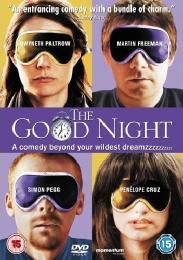
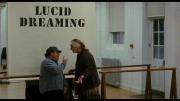
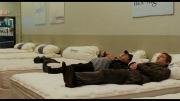
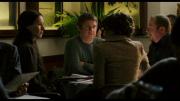
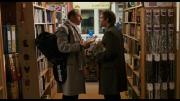
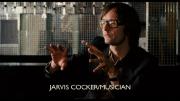
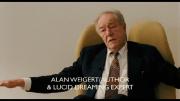

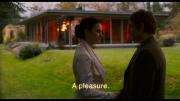
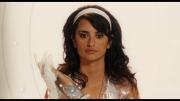
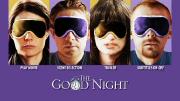































Your Opinions and Comments
Be the first to post a comment!